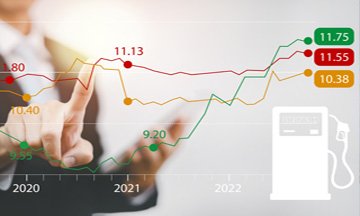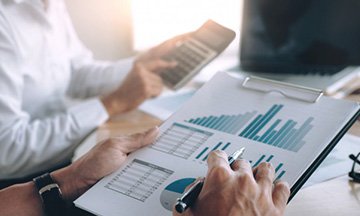Petroleum Economics Training
| Date | Venue | Duration | Fees | |
|---|---|---|---|---|
| 29 Apr - 03 May, 2024 | Dubai | 5 Days | $4750 | Register |
| 06 May - 10 May, 2024 | Dubai | 5 Days | $4750 | Register |
| 10 Jun - 14 Jun, 2024 | Dubai | 5 Days | $4750 | Register |
| 24 Jul - 26 Jul, 2024 | Dubai | 3 Days | $3950 | Register |
| 05 Aug - 09 Aug, 2024 | Dubai | 5 Days | $4750 | Register |
| 30 Sep - 04 Oct, 2024 | Dubai | 5 Days | $4750 | Register |
| 07 Oct - 11 Oct, 2024 | Dubai | 5 Days | $4750 | Register |
| 13 Oct - 17 Oct, 2024 | Muscat | 5 Days | $4950 | Register |
| 18 Nov - 22 Nov, 2024 | Dubai | 5 Days | $4750 | Register |
| 16 Dec - 20 Dec, 2024 | Dubai | 5 Days | $4750 | Register |
Course Overview
What is petroleum economics all about?
Petroleum Economics is a blend of study about petroleum sources, distribution, financing and economics. Petroleum is the most important natural resource in the world due to its higher reliance in every sector or industry. The study of petroleum economics is crucial due to its heavy reliance, dynamic pricing, availability, complicated transportation system and role in industrial progress.
What is the economic importance of petroleum?
Although, Petroleum economics is a complex subject because of political and economic interactions with oil industry and regulatory agencies. Petroleum economics is connected to various fields such as shipping, manufacturing and transport. The concepts of cash flow in the oil industry, organizational challenges in oil finance, price forecasting, cost management, and drivers and risk management are some topics petroleum experts must know.
This Zoe training program focuses on the economics and business of Petroleum addressing skills required for complex decision making in areas such as economic analysis of Petroleum industry, investment analysis, and the making of government petroleum plans and policies.
This Zoe training will give complete skillset to become a successful expert in Petroleum Economics. The course covers all critical financial aspects of Petroleum in detail, thereby providing required practical experience to take responsibility in these areas. This course will provide greater opportunities to showcase skills and potential. The course will provide multiple growth opportunities across many Petroleum organisations. Understanding the various Petroleum economics techniques available such as economic modelling, decision analysis, and exploration analysis will be discussed. These topics will enable delegates to communicate better with economics professionals, within and external to their organization, and to become more effective managers.
Course Objectives
The main objective of Masterclass Petroleum Economics training program is to equip professionals with the following:
- Information and knowledge of energy economics specific to Petroleum
- Awareness and understanding of international standards and concepts related to Petroleum companies and projects
- How better management of Petroleum can cause organisational development and operational enhancement
- The necessary skills and experience to train other professionals regarding best practices of petroleum economics
- The experience and exposure to address appropriate aspects of climate change and use of Petroleum
- The required analytical skills to accurately assess Petroleum supply and demand
- The skill set and capabilities to work with various energy models to increase efficiency and overall delivery
- The expertise to assess risks, alter course for effective resolutions at the earliest
Training Methodology
The training courses of Petroleum economics at Zoe Talent Solutions are framed with scope for customisation as per the academic and/or professional backgrounds of the training audience of each batch. This involves thorough review of the training content before the commencement of each training session. An experienced professional from the related domain delivers the training using detailed audio-visual live sessions. The trainer also encourages two-way communication and participation of attendees using group activities and projects.
Zoe Talent Solutions conceptualized the above innovative model of training and this approach is used for all their courses. This approach is known the Do–Review–Learn–Apply Model.
Personal benefits
Professionals undertaking this Petroleum economics training course will get the following benefits:
- Understanding of all critical aspects of Petroleum economics and finance
- Enhanced analytical skills to effectively and accurately assess Petroleum supply and demand
- Increased knowledge, confidence and skillset to train other employees for best practices
- Better ability & understanding to grow and change processes for improved organisational development
- Understanding and knowledge of modern techniques related to Petroleum finance, enabling trainees to assume higher responsibilities in energy finance in any organisation
- Better understanding and analytical as well as strategic skills to work with different systems and choose appropriate models for managing Petroleum financing and economics
- Better farsightedness to predict risks and make arrangements to lessen the downside of these on the company
- Increased skillset and capabilities to actively take part in the formulation of energy policies to drive Petroleum supply, distribution and consumption effectively
Organisational Benefits
The organization will gain following benefits from petroleum economics course:
- Petroleum Economist guide and train other members of the organization
- Organization would know that how economic attractiveness of upstream oil and new gas ventures can be initiated and evaluated
- Better economic decisions keeping in reserves classification in mind, production forecasting, inflation, contractual arrangements and risk
- Better understanding of new opportunities for financing petroleum projects
- Successful risk assessment, analysis & alleviation with the help of a detailed analysis by trained specialists
- Better prediction and assessment of petroleum demand to increase profits, thereby contributing to organisational profit and growth
- Higher client satisfaction because of a good balance between petroleum supply and demand, preventing delay in delivery to the customer
- Application and employment of advanced concepts
- Use of energy models to build efficiency and further productivity within the company
Who Should Attend?
- Economists and Analysts working in the Petroleum industry
- Geoscientists working in oil and gas sector
- Reservoir and petroleum Engineers
- Production associates and Engineers
- Policy Development Executives in Petroleum sector
- Negotiators related to the petroleum industry
- Financiers and Decision-makers in Petroleum Industry
Course Outline
Module 1: PETROLEUM AND PROCESSESS
- Up-stream Activities of the Energy Sector
- Up-stream activities of energy and Petroleum
- Oil & natural gas exploration
- Drilling and production
- Technology is finding the oil and gas
- Exploration techniques for Petroleum
- Enhanced oil recovery & reserves of crude oil
Module-2: ASSETS
- Assets management
- Factor affecting assets value
- Life-cycle of oil assets
- Manage and evaluate the up-stream assets
- Operating costs of assets
Module-3: PETROL ECONOMY – I
- Energy & petroleum sector | Mid-stream activities
- Crude oil & natural gas economics
- Recovery and transportation
- Pipeline transportation in oil and gas
Module-4: PETROL TRANSPORTATION
- Pipeline transportation management
- Pipeline operating costs & maintenance
- Cross-border pipeline transportation and crude oil
- Oil shipping and tanker charting
- Pricing of energy and petroleum products
Module-5: ROLE OF REFINERIES AND SUPPLY CHAIN
- Energy and petroleum sector| Down-stream activities
- Finished products supply i.e., Refining activities
- Technology and it’s part in refining & conversion
- Petrol Supply chain economics
Module-6: BUSINESS STRATEGIES FOR PETROLEUM
- Demand and market for petroleum products
- Strategy for Petroleum
- Retail business and petrol-retailing
- Petro-accounting
- Reverse recognition accounting and full-cost
- Financial & income statements
Module-7: TRADING OF PETROL
- Oil Trading and Geopolitics
- Global business and current status in petroleum industry
- Down-stream refining & marketing
- Trend & structure of oil
- Hydro-carbon domestic & global Economic environment
Module-8: MODERN TECHNIQUES
- Petro-informatics
- Advancement petroleum industry
- Petro e-business and e-market
- Architecture of E-gas station
- Oil and gas industry|Next-generation services
Module-9 : PETROL ECONOMY – II
- Micro-economics
- Macro-economics
- Industrial Economics
- Revenue and is influenced by macroeconomics
- Variables contribute to variation in crude oil prices
- The factors for forecasting prices
- Price and investment relation with drilling counts, wells explored and the supply
- New oil wells | Financial decision making
- Cash flow model for oil well











